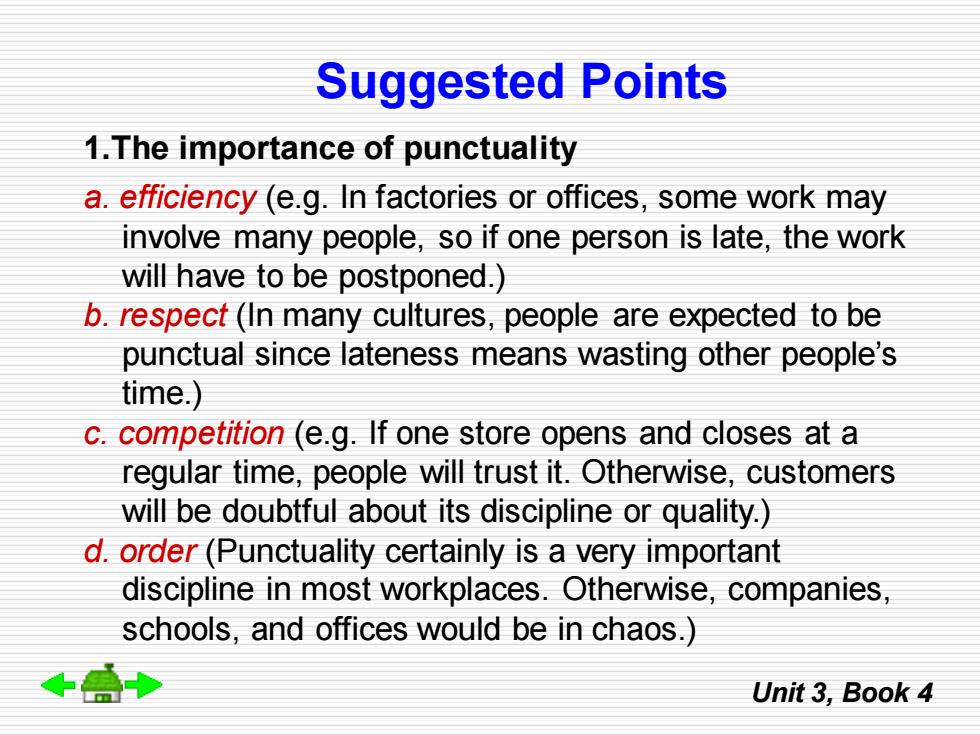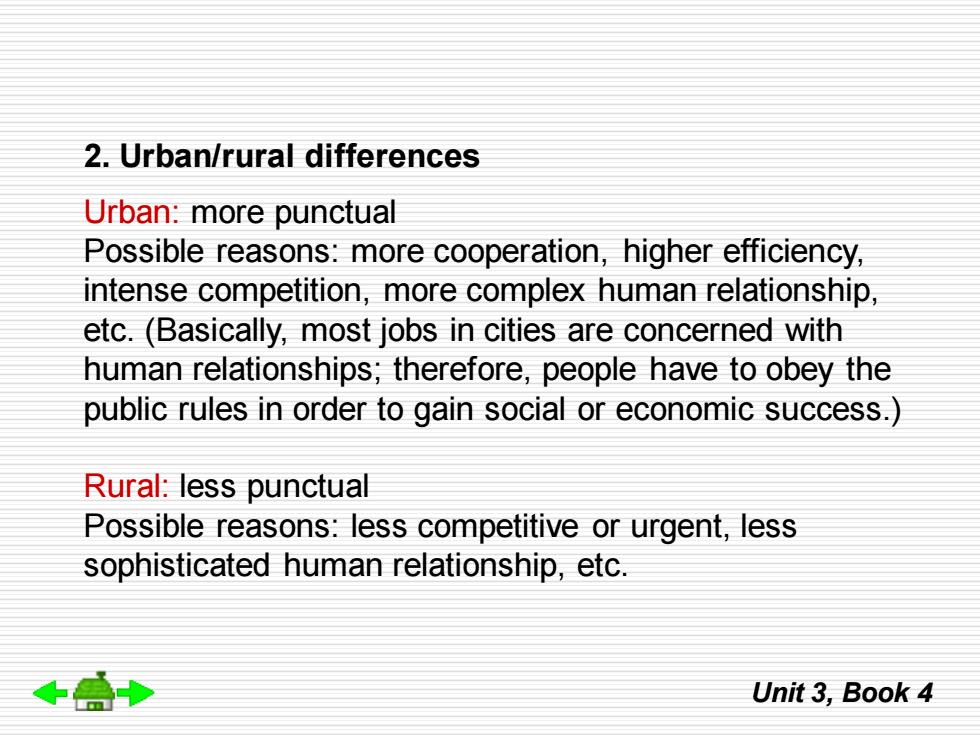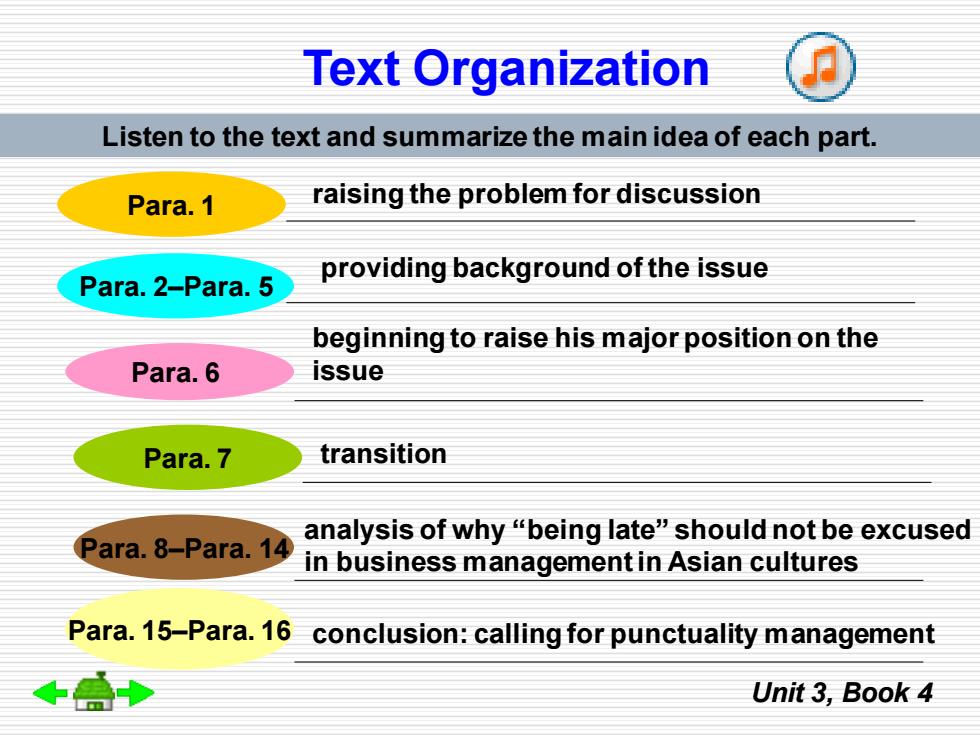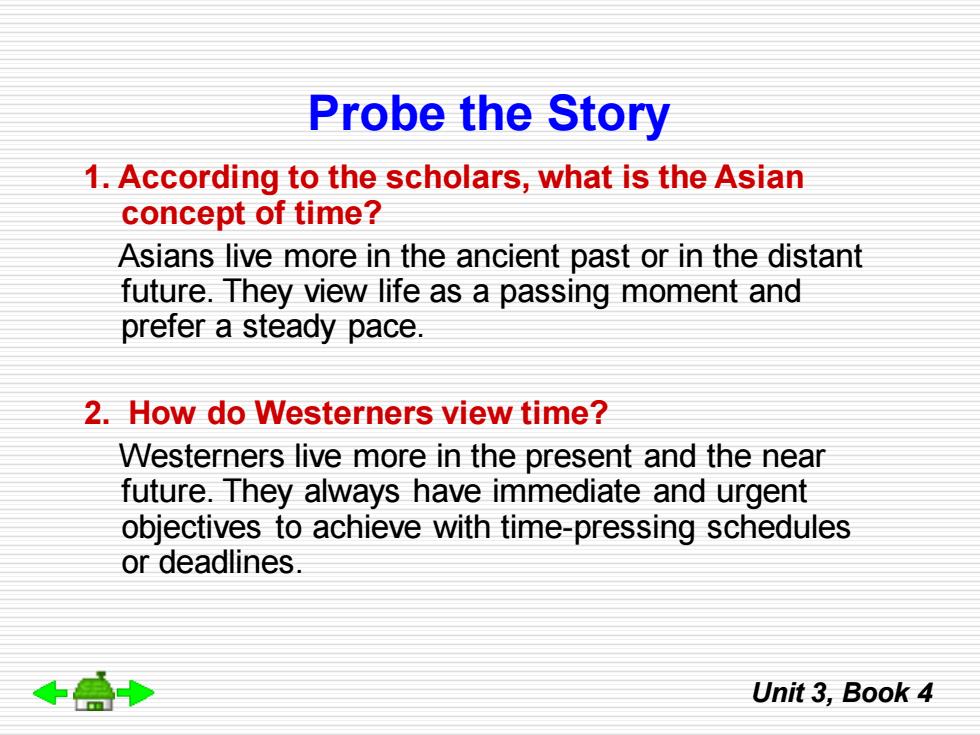
Part Il >Reading and Language Activities Unit 3,Book 4
Part II Reading and Language Activities Unit 3, Book 4

Beadig and Language Activities Pre-reading Task Comprehension Work Language Work Unit 3,Book 4 Return to Menu
Pre-reading Task Comprehension Work Language Work Reading and Language Activities Unit 3, Book 4 Return to Menu

Fre-fcectogtes Discuss the following questions. Have you ever been late for class?What excuses did you give for your lateness? Why is punctuality a necessity in all public affairs in a civilized society? Have you ever noticed the difference in people's attitude toward the keeping of time in the rural and urban areas? Suggested Points Click Here Unit 3,Book 4
Discuss the following questions. Unit 3, Book 4 Have you ever been late for class? What excuses did you give for your lateness? Why is punctuality a necessity in all public affairs in a civilized society? Have you ever noticed the difference in people’s attitude toward the keeping of time in the rural and urban areas? Suggested Points

Suggested Points 1.The importance of punctuality a.efficiency (e.g.In factories or offices,some work may involve many people,so if one person is late,the work will have to be postponed.) b.respect (In many cultures,people are expected to be punctual since lateness means wasting other people's time.) c.competition (e.g.If one store opens and closes at a regular time,people will trust it.Otherwise,customers will be doubtful about its discipline or quality.) d.order(Punctuality certainly is a very important discipline in most workplaces.Otherwise,companies, schools,and offices would be in chaos.) Unit 3,Book 4
Unit 3, Book 4 Suggested Points 1.The importance of punctuality a. efficiency (e.g. In factories or offices, some work may involve many people, so if one person is late, the work will have to be postponed.) b. respect (In many cultures, people are expected to be punctual since lateness means wasting other people’s time.) c. competition (e.g. If one store opens and closes at a regular time, people will trust it. Otherwise, customers will be doubtful about its discipline or quality.) d. order (Punctuality certainly is a very important discipline in most workplaces. Otherwise, companies, schools, and offices would be in chaos.)

2.Urban/rural differences Urban:more punctual Possible reasons:more cooperation,higher efficiency, intense competition,more complex human relationship, etc.(Basically,most jobs in cities are concerned with human relationships;therefore,people have to obey the public rules in order to gain social or economic success.) Rural:less punctual Possible reasons:less competitive or urgent,less sophisticated human relationship,etc. Unit 3,Book 4
Unit 3, Book 4 2. Urban/rural differences Urban: more punctual Possible reasons: more cooperation, higher efficiency, intense competition, more complex human relationship, etc. (Basically, most jobs in cities are concerned with human relationships; therefore, people have to obey the public rules in order to gain social or economic success.) Rural: less punctual Possible reasons: less competitive or urgent, less sophisticated human relationship, etc

Couprctcustortot ▣Text Organization ▣Probe the Story Creative Writing and Speaking ▣Difficult Sentences Unit 3,Book 4
Text Organization Probe the Story Creative Writing and Speaking Difficult Sentences Unit 3, Book 4

Text Organization Listen to the text and summarize the main idea of each part. Para.1 raising the problem for discussion Para.2-Para.5 providing background of the issue beginning to raise his major position on the Para.6 issue Para.7 transition analysis of why"being late"should not be excused Para.8-Para.14 in business management in Asian cultures Para.15-Para.16 conclusion:calling for punctuality management Unit 3,Book 4
Unit 3, Book 4 Text Organization Listen to the text and summarize the main idea of each part. Para. 1 Para. 2–Para. 5 Para. 6 Para. 7 Para. 8–Para. 14 raising the problem for discussion providing background of the issue beginning to raise his major position on the issue Para. 15–Para. 16 conclusion: calling for punctuality management analysis of why “being late” should not be excused in business management in Asian cultures transition

Probe the Story 1.According to the scholars,what is the Asian concept of time? Asians live more in the ancient past or in the distant future.They view life as a passing moment and prefer a steady pace. 2.How do Westerners view time? Westerners live more in the present and the near future.They always have immediate and urgent objectives to achieve with time-pressing schedules or deadlines. Unit 3,Book 4
Probe the Story Unit 3, Book 4 1. According to the scholars, what is the Asian concept of time? Asians live more in the ancient past or in the distant future. They view life as a passing moment and prefer a steady pace. 2. How do Westerners view time? Westerners live more in the present and the near future. They always have immediate and urgent objectives to achieve with time-pressing schedules or deadlines

3.What figure of speech does the writer use to illustrate the cultural difference regarding the concept of time? The writer uses a number of metaphors to make his point:"neurotic slavery"indicates being abnormally bound to tight schedules;"the sense of zero gravity"refers to the freedom of spending one's time at will;one's life course is compared to "a long journey";and "the next hill"suggests something within reach. Unit 3,Book 4
Unit 3, Book 4 3. What figure of speech does the writer use to illustrate the cultural difference regarding the concept of time? The writer uses a number of metaphors to make his point: "neurotic slavery" indicates being abnormally bound to tight schedules; "the sense of zero gravity" refers to the freedom of spending one's time at will; one's life course is compared to "a long journey"; and "the next hill" suggests something within reach

4.Does the writer agree to the claim that unpunctuality is related to a certain cultural outlook?Why? The writer does not agree to the claim.He thinks that whether a person is punctual or not has nothing to do with his cultural outlook, because observance of time and philosophical perception of time are two different things. Unit 3,Book 4
Unit 3, Book 4 4. Does the writer agree to the claim that unpunctuality is related to a certain cultural outlook? Why? The writer does not agree to the claim. He thinks that whether a person is punctual or not has nothing to do with his cultural outlook, because observance of time and philosophical perception of time are two different things